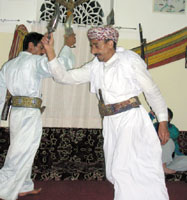
Dance and Music in the Haraz Mountains [Archives:2005/869/Last Page]
August 18 2005
 |
For the Yemen Times
The Haraz Mountains are the ideal retreat for rest and recreation away from the pressures of city life. Aside from the refreshing mountain air, the spectacular views, and opportunities for invigorating walks, something else is going on, regularly and with great fervor and enthusiasm.
It happens at the Al Hajjarah Hotel in the village of Manakha every night, reviving and sustaining an ancient Yemeni tradition, thanks to Abdullah Mohammad Al-Aqel, who passed the tradition on to his sons, and for the last twelve years, has shared the celebrations almost nightly with visiting foreigners. Abdullah and his sons continued operating the business, despite a downturn in tourism after September 11th, and the need to relocate the hotel a few years ago.
Music and dancing have always been important for Yemenis, and even when the Imam Yahia outlawed music and dancing, the people continued behind closed doors. Musicians moved to Aden, which was under British rule, especially the 'ud and mismar (flute) players, whose instruments became harem, forbidden to be played.
All this changed again after the Revolution in September, 1962. Fortunately, the Bara' dance was never outlawed, and always continued to be performed at festivals and weddings.
“Our ancient drums and were used in the past to alert people of danger, call them to a meeting or lead the tribe into battle. Now the drums are played at wedding celebrations,” says Abdullah Al-Aqel.
The 'ud is often played also, an instrument, attributed with healing powers, “invigorating the body and placing the temperament in equilibrium, a remedy which calms and revives hearts”, wrote Mohammad Shihab al-Dia in Cairo in 1982. The Arabian 'ud is the grandfather of the Western lute. The songs sung to the accompaniment of the 'ud are love songs that are passed on by oral traditional from generation to generation.
The tradition of dance is also passed down from generation to generation. There are two different types of dancing;- one slow, graceful and romantic, usually accompanied by the 'ud, the other energetic and athletic, where the drums weave the exciting atmosphere. The Sanani (of which there are three dances) and the Kawkabani dances can be performed by both men and woman, while the Bara' is strictly reserved for a Yemeni male. There are different Bara' for the different regions in Yemen; – they are the Harazi, Matari, Safani, Al-Hami, Hadathi, Hamdan and Al-Habi.
Ahmed, youngest son of Abdullah, and one of the main dancers at Al-Hajjarah Hotel, is of the opinion that the best Bara' are the Harazi, Matari and the Al-Hami. The Bara' dance is taught to the young boys simply by imitating the dance steps repeatedly until finally they start to know the patterns and movements. I observed some of the very young boys beginning this process, managing to wear a large adult-sized jambiya, and to hold it up above their heads in the appropriate fashion. Their movements were uncoordinated, but one could see that with the way they were avidly watching their fathers and uncles, that in a few years they too would be confident performers of this exciting and dramatic dance, that serves to emphasize the cohesion of the group.
Abdullah, the oldest son of Abdullah Mohammad Al-Aqel, who is currently working with education, spoke about the threats to tradition in Yemen , through the introduction of satellite TV, and how this changes the focus of the people who sometimes begin to imitate Western ways, and forget their own unique traditions.
Time spent in the Haraz Mountains, at the Al-Hajjarah Hotel was of great enjoyment and a learning process. I was very grateful as a foreigner to be able to participate
in the Yemeni music and dance traditions with the family, both as an observer and as a performer. Being from a Western dance background, with some exposure to African and Arabic dance, it was both challenging and insightful to see how dance and music evolved and played its role here, serving the people in their different localities and tribes across Yemen, throughout the centuries.
Thank you to Abdullah Mohammed Al-Aqel and his sons of Al Hajjarah Hotel, Manakha, for preserving the traditions with such great enthusiasm and vitality, and for sharing it so generously with the visiting foreigners from many different parts of the globe.
——
[archive-e:869-v:13-y:2005-d:2005-08-18-p:lastpage]


